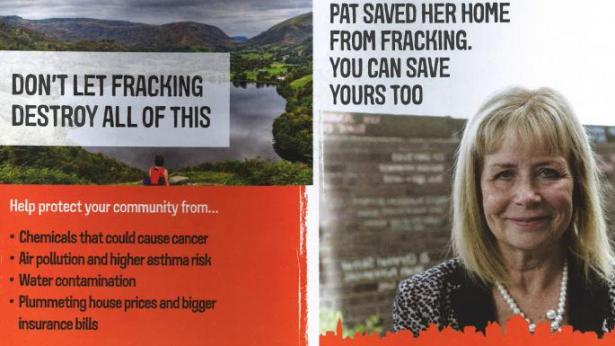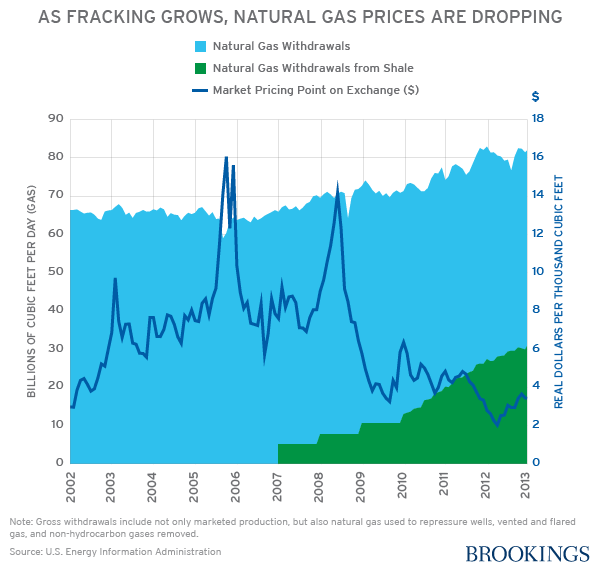Retired vicar, Reverend Michael Roberts, has scored a little victory. He challenged the myths promoted by environmentalist campaigners, Friends of the Earth (FoE) and won.
A fund-raising leaflet fell out of his weekly copy of Private Eye which stated that hydraulic-fracturing to extract shale gas (fracking) kills people. Rev. Roberts teamed up with retired physics teacher, Ken Wilkinson, to submit a complaint to the Advertising Standards Authority (ASA). Together, they challenged FoE’s claim that fracking poisons water supplies, causes cancer and destroys the countryside. The ASA found that the FoE claims were contradicted by the wealth of evidence available. They ordered FoE to stop raising funds by promoting scare stories and presenting lies to gain support.

The retired Reverend was once a paid-up supporter of FoE. He thought, as many do, that the group funds schemes that preserve the natural environment. He was spurred into action when FoE falsely claimed that fracking would destroy the area in which he lived and fabricated the potential risks.
Although anti-fracking activists rarely garner local support, they do have allies in high places. The Climate Change Bill 2008 was drafted by Bryony Worthington, an FoE activist brought in by Ed Milliband to ensure that the environmentalist agenda dominated government policy. Since the Climate Change Act was passed, energy policy has been solely directed towards reducing carbon dioxide emissions and increasing the cost of energy. An array of taxes, subsidies and market manipulations have been imposed in the past 8 years. The powerful Environmental Audit Committee overseas government departments’ compliance with objectives drawn up by green lobbyists. The opportunity presented by fracking has been hampered by Green consultants with access to national and local government decision makers backed up by activist campaigns. Bryony Worthington has now been elevated to sit in the House of Lords.
Despite its evident benefits, fracking is routinely opposed by the politicians in the areas which would benefit most. The Welsh Assembly, the Scottish Parliament and numerous Councils across northern England have imposed bans on planning applications for exploration and drilling licenses. The 2016 decision to ban fracking by Wakefield Council, in the heart of the now defunct Yorkshire coalfields, is instructive. The council debate was dominated by myths promoted by FoE. Councillors queued up to denounce any ‘claimed’ benefits, like jobs or reduced energy prices. The Head of Wakefield Council. Councillor Peter Box, bizarrely invoked the forthcoming extinction of gorillas resulting from climate change as the final reason to impose a moratorium. The vote was against fracking was unanimous.
Although fracking is now going ahead at one site in Lancashire and another in North Yorkshire , these are the exceptions. The environmentalists are filling a political vacuum. In the absence of a publicly argued case in support of fracking, opinion polls have shown a steady decline in support, from 44% in 2014 to 32% in 2015. The case for a prosperous society, shaped by human ingenuity and fuelled by cheap reliable energy, has simply not been put. Politicians who understand the benefits are timid and the government has sought to allow fracking by introducing bureaucratic and legalistic manoeuvres to over rule Council planning bans. It has been left to energy companies, like Caudrilla and plucky local people, like Reverend Roberts to challenge the propaganda and put forward the positive case.
It is estimated that the UK has 25 trillion cubic feet of shale gas, one of the richest shale gas deposits in the world. There is an estimated £70 billion worth of shale gas in South Wales alone. Fracking could provide a boom in cheap energy at a time when the North Sea oil reserves are drying up.
A boom in cheap gas would reduce energy costs for us all and end fuel poverty. In the US, where shale gas extraction has created a boom, citizens have seen their gas bills fall by 50%. ONS statistics in the UK estimate that 25,000 pensioners die unnecessarily each winter because they can’t afford adequate heating.
Fracking would provide a boost for UK industry. The cost of industrial energy in the UK is currently the most expensive worldwide and it continues to rise. Energy intensive industries would benefit most from reduced costs. Those producing ceramics, bricks, steel and aluminium are struggling. The next generation of data centres supporting the information-processing economy would be encouraged to expand. Well-paid engineering and maintenance jobs would be created for local people in de-industrialised areas which currently see growth only in low paid, insecure jobs.
The US State of North Dakota has created $2 billion fund based on shale gas state taxes in a single year. Funding for local councils in shale gas areas of the UK would more than off-set the current central government cuts.

The opinion of a small minority of green activists has been taken on board by the establishment more broadly. Western leaders, looking for a cause, have championed the never-ending campaign to ‘save the planet’. Politicians from David Cameron to Jeremy Corbyn have sought popularity by courting the greens. They have mistaken a noisy minority for a popular cause. They have sought validation at international climate conferences as a replacement for popularity at home.
Human progress and increasing wealth is predicated on cheap and plentiful energy. The case needs to be put for cheap energy as the fuel for a new industrial revolution. Energy policy should be based on the three simple principles: cheap, reliable and plentiful with a light-touch regulatory regime guided by genuine risk . Councils in Wales, Scotland and the north of England should to be exposed for their unquestioning acceptance of environmentalist propaganda. They should be challenged for their opposition to economic prosperity. MPs should ditch the Climate Change Act and provide a supportive licensing regime to fuel a shale gas boom. In the 1970s, technical innovation and investment drove the North Sea oil revolution. Without leadership to drive economic development, the UK will continue to bounce along the bottom.
Well-funded, well-connected and highly motivated Green lobbyists have a timid and disorientated political class in their thrall. Little victories won by plucky amateurs and retired vicars are heart-warming. But the big win is a prosperous future and it’s time that we took on the fear-mongers.



The most sensible economic comments I’ve read. Ignore the detractors & doom mongers and let’s start fracking to ensure UK’s economic future. We obviously need more retired vicars.
Thank you Den
You have heroic and wise vicars. Over here on the continent we get Pope Francis. Sigh.
Can I come over your way before you fill in the tunnel?
Come on over!
So many errors, it is difficult to know where to begin!
Firstly, you may wish to read the real story of the Reverend Roberts and Ken Wilkinson VS FoE and the ASA decision here http://www.theecologist.org/blogs_and_comments/commentators/2988548/lord_smiths_conflict_of_interest_why_we_cannot_trust_the_asa_on_fracking.html
After thoroughly reviewing the demands from the EPA Science Advisory Board, comprised of the EPA’s own scientists, the agency released the final report , heeding their recommendations and clarifying that the agency found contamination at every phase of the fracking process.
The EPA and independent peer-reviewed studies have identified many mechanisms of contamination, such as spills, well cementing failures below ground, and complications with waste disposal. The EPA originally found there was on order of 15 spills every day somewhere in the United States, yet chose to dismiss those daily incidents http://paagainstfracking.org/2016/12/13/breaking-epa-listens-to-science-advisory-board-confirms-fracking-impacts-drinking-water/#.WFA02y0Goe5.facebook
Fracking has lowered fuel bills in the US, but even the most staunch proponents agree that this is highly unlikely to be the case in the UK.
Climate change is real, and fracked gas is often touted as a cleaner alternative to coal due to lower CO2 emissions, but if methane emissions are also part of the equation, any benefit is lost, and it is therefore not the transition fuel to renewables some would like us to believe.
I live near the site where Cuadrilla recently began site preparation and initially, when fracking was first mooted, was not overly concerned. When we experienced seismic activity due to the drilling at Preese Hall, I began to investigate fracking, and to date have read nearly 500 of the 900+ peer reviewed research papers that link fracking and related activities to air, water, public health and environmental impacts.
I wish you well in your crusade , but I remain firmly of the opinion that history will prove us right to have been opposed to fracking.
Kate, thanks for taking the trouble to respond with an informed argument. This is a rarity and it is much appreciated. Every technology is opposed by conservatively-minded people and fossil fuels themselves are attached by a vocal minority. But, its worth standing back a little. If you look around you now, everything is a direct result of the use of fossil fuels. Everything. Cheap fuel powers modern life and the anti-fracking crusaders want the benefits of modern life without the means to achieve it. You can focus on scary reports produced by campaigners or you can consider the benefits of cheap fuel on modern life. People inconvenienced by gas extraction should certainly be compensated and there would be plenty of money available to do it.